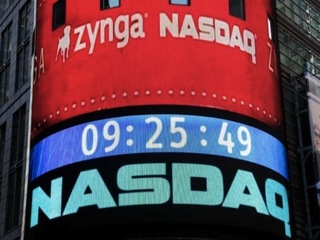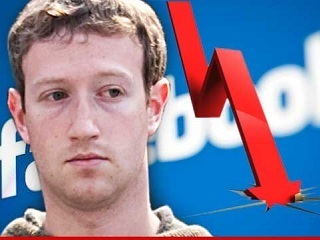Rising infertility concerns fuel growth of male-focused innovative startups
Fertility treatments are more relevant than ever; here are a few startups pioneering new solutions
Read more...
Facebook stock reaches a new all-time low today as the company lock up period for early VC investors expires Thursday. The social giant's stock traded as low as $19.69 this morning before bouncing back to $20 in midday trading. That's still 5% down, from Wednesday's close and about 48% below its initial public offering price of $38.
By noon, nearly 100 million shares had traded, more than three times the average volume on a full day, but Facebook executives and those familiar with the stock expected volatility today as this first lock-up segment ended.
Roughly 271 million shares are eligible to be sold today from investors such as Microsoft, Accel Partners, Tiger Global Management, Goldman Sachs and Peter Thiel.
Lockups are a common practice for companies to set up as they go public and other upcoming lockup dates to put on the calendar for Faceboo include October 15 through November 13 when directors and employes can release 243 million shares, then November 14 when more VCs and Mark Zuckerberg can unload up to 1.3 billion shares and the December 14 when later stage VC can release up to 149 million shares.
The Facebook stock has had a rough couple of introductory weeks as investors have been concerned about Facebook's ability to increasing revenue and monetize its mobile share.
News from the Q2 report
Just three weeks ago when Facebook released its first post-IPO quarterly earnings statement, investors grew concerned with the numbers they saw.
While mobile MAUs rose to 543 million, up 10% from the 488 million users that were logging on via mobile device back in April, and up 67% from last year, the idea of gaining money from this sector has not yet been realized.
CEO and founder, Mark Zuckerberg pointed out in the earnings call that “mobile is a huge opportunity for Facebook,” and that people that use the mobile service are 20% more likely to log in daily, making these people very dedicated users.
Facebook launched several new mobile products this quarter, including a new Facebook Camera app for iPhone, an improved version of the mobile messenger app for both iOS and Android, as well as several updates to the Facebook Android app.
Facebook also launched global App Center where users can discover relevant apps for both mobile and the Web as well as announced plan for deeper integration with future Apple products and software.
As part of the mobile strategy, Facebook has been doing its fair share of acquisitions and acqui-hires such as its grab of Instagram and the mobile-centric usership base it was built on.
Facebook has also had the challenge of bringing the Facebook experience and advertising with a much smaller screen space.
Ebersman also explained that payments (digital goods) revenue has remained “essentially flat” due to the transition that users are making to mobile.
This is a part of the problem that Zynga struggled with earlier this week when it reported its quarterly earnings but has not created a fully robust mobile community of people that spent on digital goods. In the coming months, both Facebook and Zynga hope to improve the atmosphere of their mobile platforms so that more people see it as an equally suitable place to game and buy goods.
Zuckerberg even added that the “mobile experience (for Facebook right now) is fairly basic compared to what many people want.” An issue that he thinks the App Store and continued collaboration with Apple and Google will improve soon.
Revenue from advertising, which is 84% of Facebook's revenue, shot up 28% to $992 million.
Facebook explained that 70% of campaigns resulted in a return on ad spend of 3x or better, and 49% of campaigns showed a return on ad spend of 5x or better.
CFO for the company, Sheryl Sandberg explained to investors, on the earnings call, that social Facebook ads have a 98% better recall than any other ads on the Web and the company will keep encouraging growth in the social ads. Right now just over half of the ads appearing on Facebook are social in nature, meaning that they are tied to things that you or your friends have expressed interest in and involve some type of action to take.
Last quarter, sponsored stories saw 53% more engagement than standard ads, and mobile ads had four times the engagement of Twitter ads.
The latest report from TBG Digital, released last month, stated that the cost per thousand impressions (CPMs) on ads on the social network increased by 58% compared to the same period last year and overall engagement also grew by 11%. This reversed the decline experienced the previous quarter.
Fertility treatments are more relevant than ever; here are a few startups pioneering new solutions
Read more...After a trial in select locations, Elon Musk is expanding its fee to more X users
Read more...The tools include content such as educational videos, recipes, and daily nutrition tips
Read more...

